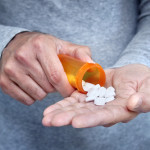Much as I love ‘em, dairy products seem to give me gastrointestinal distress. Is that the terrible smell of lactose intolerance? How do you spell relief?
—South Philly Cheesehound
Philly Dearest,
It’s a sad day when you have to say sayonara to the Swiss and arrivaderci to the asiago, but don’t take it personally: Lactose intolerance—the inability to digest the main sugar in dairy products—runs so rampant among humanoids that as many as eight out of 10 homo sapiens may have to do just that. It’s udderly unreal!
Time for a little zoology lesson: In mammals, production of the intestinal enzyme needed to break down lactose (luckily labeled lactase) slows once the young’n is weaned (around age 2 in humans)—which eventually makes milk and its derivatives madness to digest. (Some people who make with the moo juice daily, however, seem to prolong the enzyme’s production for years.) Ethnicity plays a role: 90 percent of U.S. adults of Asian ancestry are lactose-unfriendly, as are 75 percent of those of African, Mexican, Native American and Jewish descent. Perhaps owing to millennia of herding cows, Northern Europeans and their offspring seem least affected. Lactose intolerance can also be triggered by sundry disorders such as parasitic infections, inflammatory bowel disease, intestinal surgery and cancer treatments. Don’t be shocked, Phil, to find out that because Mr. HIV and the drugs you may take to fight him tend to have such a firm grip on the gut, most people with AIDS are also prone—whether or not they started out with symptoms.
How can you tell if you’re afflicted? The hallmarks—bloating, gas, cramps, acid indigestion, nausea, watery diarrhea, even fatigue—set in anywhere from 15 minutes to three hours after ingesting the illicit white substance. (A milk allergy, by contrast, will cause rashes and respiratory problems.) The severity of symptoms is—no surprise—proportional to the dose of dairy or extent of intolerance. There are a few tests used to diagnose the problem—breath, blood and bowel movement, take your pick—but the cheapest and easiest may be done in the comfort of home. After eschewing dairy items for three weeks, drink a nice cold glass of milk. If, within a few hours, the farting’s starting, guess what? Right, Einstein, odds are you’ve been diagnosed positive for lactose intolerance.
While you can’t bring back lactase-making magic once lost, you can deal with lactose intolerance by avoiding the dairy case, spending less time in it, or at least picking out less-lactose-laden items. In general, higher fat content means lower lactose. Sweet acidophilus milks, aged cheeses (try cheddar or Parmesan) and yogurt are good bets because fermentation has broken down most of the lactose. Learn what dairy products (if any) you can enjoy while taking a pass on passing gas: Some intolerants can still drink milk or lick an ice cream cone if they do it in moderation; other’s can’t even stand a dash of cream in their coffee.
Don’t be fooled by innocent-looking foods that may actually be lousy with lactose. Among those surreptitiously saturated are some brands of: breads, creamy peanut butter, microwave popcorn, hot dogs, nonkosher lunch meats, canned tuna, salad dressings, gourmet instant coffees (yawn), dried soup mixes, margarine, instant potatoes, pancake and baking mixes (say it ain’t so!), processed cereals, powdered creamers, whipped toppings and even never-hurt-a-fly chewing gum. You’re wise to look at a label’s fine print: Besides milk or lactose, the words whey, curds and dry milk solids or by-products are red flags. And be warned that lactose also lurks in some prescription drugs and over-the-counter meds, among them antibiotics, antidepressants, aspirin, and antacids—and that’s just the As. Your AIDSy meds may also be laced with lactose (ask your pharmacist); culprits include saquinavir hard gel caps (Invirase), acyclovir (Zovirax, 200 mg capsules) and azithromycin (Zithromax).
Remember, though, that by avoiding dairy you may be missing much-needed calcium; make sure you’re boning up on it with supplements or other sources such as green veggies (kale, broccoli), seafood (salmon, sardines, shrimp, oysters) or tofu.
Some lactose-sensitive folks can benefit from nonprescription lactase enzymes. Another option is to say buh-bye bovines and switch to any number of plant kingdom substitutes—soy, rice, almond or oat milk—that abound in supermarkets and health food stores. Sorry, Phil, I guess now’s not the time for Nurse to share her fabled fondue recipe, so I’ll sign-off simply: Got laid, I mean, Lactaid?
Milk Got You?
If you’re livid with lactose, Nursie’ll wean ya.






Comments
Comments